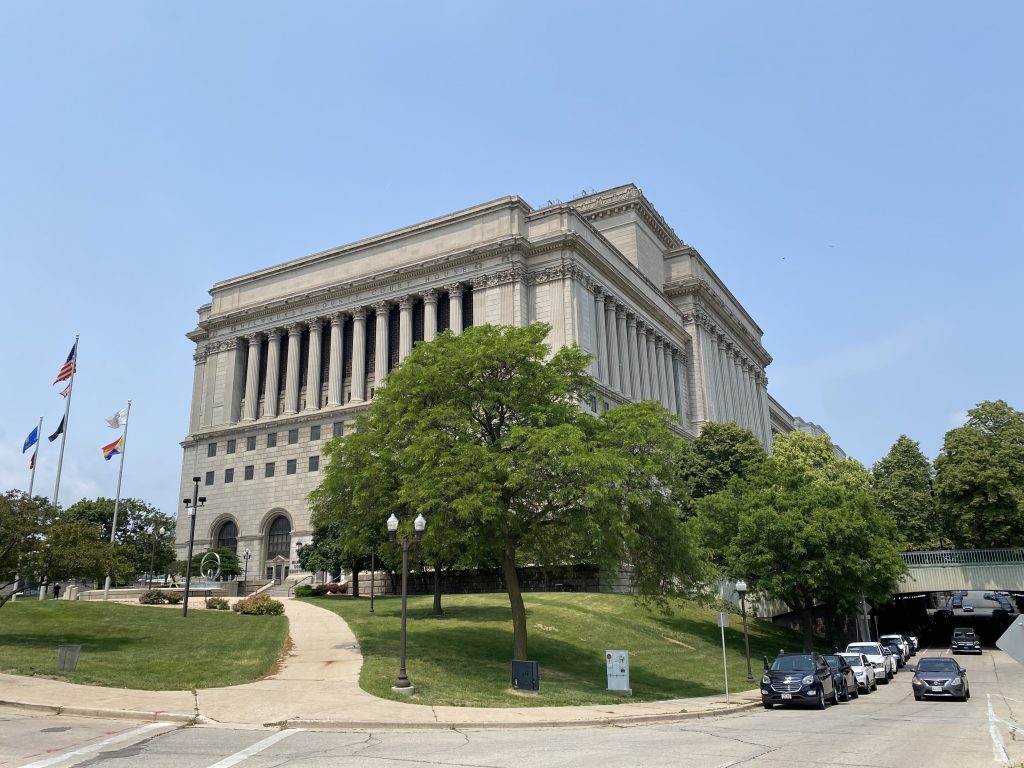County Public Hearing Debates Sales Tax
Most speakers favor sales tax hike, citing the specter of massive cuts to government services.
After a lengthy briefing from Milwaukee County officials on a proposed 0.4% sales tax increase, the Milwaukee County Board of Supervisors held the first formal event Tuesday at the Milwaukee County Courthouse to hear public opinion on the issue of a sales tax increase.
During the public hearing, supervisors heard from nearly two dozen county residents. Most who spoke or registered a position were in favor of the sales tax increase. Roughly one-quarter of speakers Tuesday were against a sales tax increase.
While supervisors have been hearing from constituents informally for some time, this was the first public meeting called specifically for the purpose of gauging public opinion on the issue. There are also a series of town halls that a handful of supervisors have scheduled around the county in July.
Supervisors sitting on the board’s powerful Finance Committee will be the first to consider a sales tax increase and its attendant changes to the county’s pension system. Most supervisors have not yet registered a public position on the matter.
At the public hearing Tuesday, residents that were for or against can be broadly grouped under two competing arguments about the issue.
There was the against camp, which largely contends the county board should under no circumstance approve a sales tax because it is a regressive tax that will affect the pocketbooks of poor and working residents. Then there was the pro-sales tax group, which argued that the county finds itself in the exact circumstance that requires passing the tax increase, with financial catastrophe looming in the near future and a sales tax increase being the only tool officials legally have at their disposal to address it.
Not every one who spoke fit neatly into those boxes, as some did not express support for a sales tax but nonetheless implored supervisors to protect services like the Milwaukee County Transit System — which faces a massive fiscal cliff in the coming years.
Among the county residents that spoke Tuesday, were a number of elected officials and local leaders from the private and non-profit sectors. Some of the current and former politicians that spoke have been involved in the years-long push for a county sales tax increase.
Former supervisor and current State Rep. Sylvia Ortiz-Velez was the first to speak. She remembers hearing the “reality” about the county’s financial situation for the first time after she was elected in 2018. What is before the board now, in 2023, is the result of Wisconsin’s “political reality,” she said. It’s the best deal that was possible under the state’s politically divided government.
Ortiz-Velez was joined in supporting a sales tax increase by three of her Democratic colleagues in the state Legislature: State Sen. LaTonya Johnson and State Representatives Evan Goyke and Kalan Haywood II. Johnson said the “status quo” was unsustainable and would imperil the county’s abilities to provide government services. On top of that, she said, this is the only option the county has left. “The state is not going to come to our rescue,” Johnson said. “They have made that perfectly clear.”
One resident speaking against the sales tax, Jessica Cook, said the sales tax is “inherently regressive” and said that after a few years of high inflation a sales tax hike would have a “widespread, and hard impact on already marginalized communities.” Another speaker, Stephanie Lohman, expressed similar concerns about the tax’s impact on poor and working-class residents, saying, “Sales tax are just a grift by the rich to shift the burden of our society to the working poor.”
Two speakers in favor, Joel Brennan, president of the Greater Milwaukee Committee and Peter Rickman, president of the Milwaukee Area Service and Hospitality Workers Organization, both told the board that while the sales tax in front of them may seem unpalatable, the converse option is worse. They also both noted that the deal before the county looks the way it does because Milwaukee was not “bargaining from a position of strength,” as Brennan put it. That’s in part due to the decades of “neglect” by the state that Milwaukee leaders had to bargain from a weakened position, he added.
“The inevitable service reductions that we face will have an immediate, negative impact on us,” Brennan said.
“It’s not just a sales tax,” Rickman said. “It’s a moment where you all are going to decide whether our county and our city… end up in a death spiral.” The union leader said his organization wrestled with what position to take on the issue, but arrived at support for a sales tax increase because those most affected by a decimation of local government services “are the folks who are punching a clock every day, and figuring out how to make it from job to job on the buses.”
One speaker, Terry King, said she wasn’t necessarily for or against a sales tax. Instead, she pleaded with the board to protect transit, explaining that she is a daily transit rider who does not have a car and relies on the bus to access grocery stores and health care, neither of which are in walking distance for her. “If we don’t have county transit, we won’t have any way to get anything that we need,” she said. “We have to fund transit. It means jobs, it means schools, it means everything.”
Dawn Barnett, co-executive director of Running Rebels, spoke in favor of the increase. She noted that hers and other organizations have worked with the county to provide services for youth that find themselves caught up in the criminal justice system. A “fiscally healthy county” will allow these services to continue, she said.
Theodore Lipscomb, Sr., former chairman of the county board, addressed the body that he once presided over, saying, “I’m sure that all of you would write a different version of the bill.” Lipscomb was one of the county leaders that began advocating for a sales tax years ago. “That’s the tool that you have to save yourselves, and that you have to save us, the taxpayers who want services.”
The former chairman said he has heard all the arguments about a sales tax being regressive, but noted that most of the services the county provides help those who are less well-to-do.
“Well where do you think the cuts are gonna fall?” the former chairman said. “The cuts are regressive as well.”
If you think stories like this are important, become a member of Urban Milwaukee and help support real, independent journalism. Plus you get some cool added benefits.
MKE County
-
J.D. Vance Plays Up Working Class Roots, Populist Politics in RNC Speech
 Jul 17th, 2024 by Graham Kilmer
Jul 17th, 2024 by Graham Kilmer
-
Ron Johnson Says Free-Market Principles Could Fix Education
 Jul 17th, 2024 by Graham Kilmer
Jul 17th, 2024 by Graham Kilmer
-
RNC Will Cause Some County Services To Be Moved to Wauwatosa
 Jul 12th, 2024 by Graham Kilmer
Jul 12th, 2024 by Graham Kilmer






















